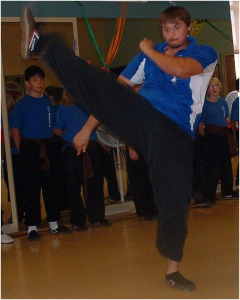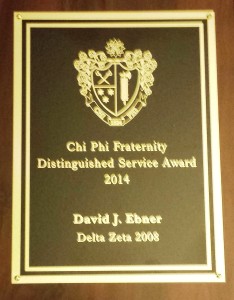When we joined Chi Phi, we became Brothers. We became part of a larger family, and we developed a bond, a Brotherhood, that joined us as a family. But Chi Phi is not the only place to find Brotherhood, and Alumnus Alex Petrilak found this familial bond in the form of Kung Fu.
Brother Petrilak, a member of the Alpha Omicron class, graduated in 2013 with a Bachelor of Arts degree in History. He chose Kung Fu four years ago as a mean to control his anxious mind, to sculpt his physique, and to gain a renewed sense of where he stands in the Universe as a whole. He looked at other martial arts (such as Karate-Do, Jiu jitsu, and Tae Kwon Do), but as fate would have it, when he contacted the local Dogos, none of them answered the phone. “I suppose the Universe had other plans for me,” he says, “and I have yet to look back in regret.”
For those who may wonder the difference,Gung Fu (功夫 in simplified Chinese) is literally translated and defined as “the art of mastery through hard work.” Of course, anything can be considered “Gung Fu” (Kung Fu), or at least anything that requires immense dedication and an obtainable goal. “Kung Fu,” as you and I know it, is the Chinese martial art of self defense. Kung Fu has a very diverse set of systems who some believe pre-date to ancient India. However, because Kung Fu is so diverse in its systems and styles (i.e. Wing Chun, Sanda, animal styles, TaiJi, Bagua, Xingye) the origins of Kung Fu are often subjective and  often controversial. Shaolin Kung Fu, for example, was not Chinese in origin but was introduced to the Monks by Bodhidharma (Indian holy-man, between 5th and 6th century A.D.) on his way through China spreading Zen Buddhism. Shaolin Kung Fu is not Chinese in origin. It is Indian. Kung Fu employs a very fluid movement. If you have ever observed Karate, you might feel intimidated by their tense ferocity. “In Kung Fu,” Brother Petrilak explains, “we do not just strike with our fist; we strike with our entire body. That is to say, unlike Karate, a powerful punch in Kung Fu originates at your base and moves through your body like a wave until it come crashing down on an opponent. Of course, there is also your ‘Qi’ (internal energy) but alas, the principle of Qi is shared in many martial arts.” Kung Fu is primarily a stand-up fighting system such as that of Karate, boxing, Tae Kwon Do, etc. and has very little ground fighting, contrary to that of such martial arts as Jiu Jitsu (both Brazilian and Japanese), Pankration (traditional Greek wrestling) or Judo (although this is the Japanese art of the take-down, it is often integrated with traditional Jiu Jitsu ground fighting). What Kung Fu lacks for in its ground game, it makes up for in its strikes and joint locks. Like that of Hapkido (Korean art of joint-locking, grappling, throwing and striking), Chinese Kung fu incorporates Chin-na, or rather, the “art of the joint lock and submission” as well as power throws and take down originating from TaiJi (Tai Chi).
often controversial. Shaolin Kung Fu, for example, was not Chinese in origin but was introduced to the Monks by Bodhidharma (Indian holy-man, between 5th and 6th century A.D.) on his way through China spreading Zen Buddhism. Shaolin Kung Fu is not Chinese in origin. It is Indian. Kung Fu employs a very fluid movement. If you have ever observed Karate, you might feel intimidated by their tense ferocity. “In Kung Fu,” Brother Petrilak explains, “we do not just strike with our fist; we strike with our entire body. That is to say, unlike Karate, a powerful punch in Kung Fu originates at your base and moves through your body like a wave until it come crashing down on an opponent. Of course, there is also your ‘Qi’ (internal energy) but alas, the principle of Qi is shared in many martial arts.” Kung Fu is primarily a stand-up fighting system such as that of Karate, boxing, Tae Kwon Do, etc. and has very little ground fighting, contrary to that of such martial arts as Jiu Jitsu (both Brazilian and Japanese), Pankration (traditional Greek wrestling) or Judo (although this is the Japanese art of the take-down, it is often integrated with traditional Jiu Jitsu ground fighting). What Kung Fu lacks for in its ground game, it makes up for in its strikes and joint locks. Like that of Hapkido (Korean art of joint-locking, grappling, throwing and striking), Chinese Kung fu incorporates Chin-na, or rather, the “art of the joint lock and submission” as well as power throws and take down originating from TaiJi (Tai Chi).
The system of Kung Fu I practice is Northern Praying Mantis (Taiji Tang Lang Quan). Without going into detail, the praying mantis is a fearsome insect. Tenacious as it is cunning – Praying Mantis is a very popular style in China, not just because of its superb fighting system, but because of the legend of its origin. Wang Lang (c. 1650, Shandong Province, Ming Dynasty) was inspired to join the quick footwork of Monkey with that of the interlocking grappling and striking of Southern Mantis to create what we know as Northern Mantis. As the legend goes, Wang Lang observed a praying mantis struggling to push the wheel of an ox-cart. Although the mantis must surely have known he could have never succeeded in moving such an obstacle, he kept trying no matter the consequence of his failure. While many Taoists would contemplate the Mantis’ strife as a lesson that life cannot be fought against, Wang Lang instead saw the very symbol of all martial artists. No matter the adversity, no matter the cost, never give-up. Brother Petrilak does not believe his tenure in Mantis Kung Fu is any coincidence. “Like the mantis in Wang Lang’s story,” he states, “as an OCD sufferer, I too face many struggles. But, as I am sure you have assumed, the praying mantis lives within me. I look upon that story and reflect upon Wang Lang’s inspiration. While we may struggle in life, hard work and dedication has its rewards. Simply put, I do not believe in giving-up but to endure and move forward instead. Only when we stop believing in ourselves do we let the metaphoric wheel crush us and our spirit.”
Kung Fu, like many traditional martial arts, allows one to tone one’s body, sharpen the mind and boost the spirit. “Among the three principles,” Brother Petrilak admits, “I often relate to the many stories my Shifu (master) has told us over the years, each of which carry a significant moral or lesson. As previously mentioned, I suffer from OCD. Without making this a pity story, I will skip the major details of what pops into my mind; but what you do need to know is that we [OCD] sufferers tend to focus on the negative. I am often reminded by my Shifu of a story about a monk attempting to master the discipline of meditation. Upon years of practice and concentration, the monk finally learned how to ‘block’ negative emotions from entering his mind. The master scolded him for his ignorance. Perplexed by his master’s rather odd reaction, the monk contemplated as he carried water from the well to his quarters. Upon stumbling, he dropped the bowl and it shattered. It was then he realized what he hadn’t noticed all along. Each shard contained a different reflection of the moon. The monk had a grand revelation about the mind, positive and negative emotions. Although we do not like our negativity it never the less exists as a part of our consciousness. We can chose to let it cause us pain or we can simply accept it as a part of who we are and move on.”
Brother Petrilak has noticed that there is a similarity between Kung fu and Chi Phi, in that they are both a sort of family, a fraternity if you will. Like Chi Phi, they refer to each other as “Kung Fu brother” and “Kung Fu sister.” Of course, they also recognize their elders. Those who have been practicing longer are known as “Elder Kung Fu brother/ sister.” He definitely recommends the practice of martial arts to everybody. “I believe everybody has a martial art inside of them,” Brother Petrilak encourages. “It’s up to each of them to bring it out.”



